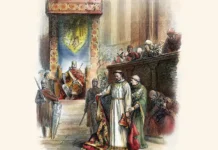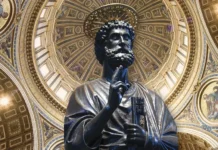When temptations seem unrelenting, the trials of life threaten to destroy us and God seemingly does not hear our prayers, it is time for confidence in Providence.
Navigating the tempestuous Sea of Tiberias with its angry waves, the disciples of Jesus fought to reach Capernaum in the black of night. They were experienced fishermen, they knew those waters well and toiled hard to execute the manoeuvres needed to keep the boat from capsizing and to arrive safely at port. Suddenly, something they see petrifies them: the Divine Master coming toward them in the darkness, walking on the water!
At first, amid cries of panic, they thought they were seeing a ghost, but they soon realized it was really Jesus, who said to them: “Take heart, it is I; have no fear” (Mt 14:27). The Apostles had already witnessed many miracles, but the sight of that majestic and serene figure coming toward them in the storm brought even more vividly to the fore the divine power of Him who had called them.
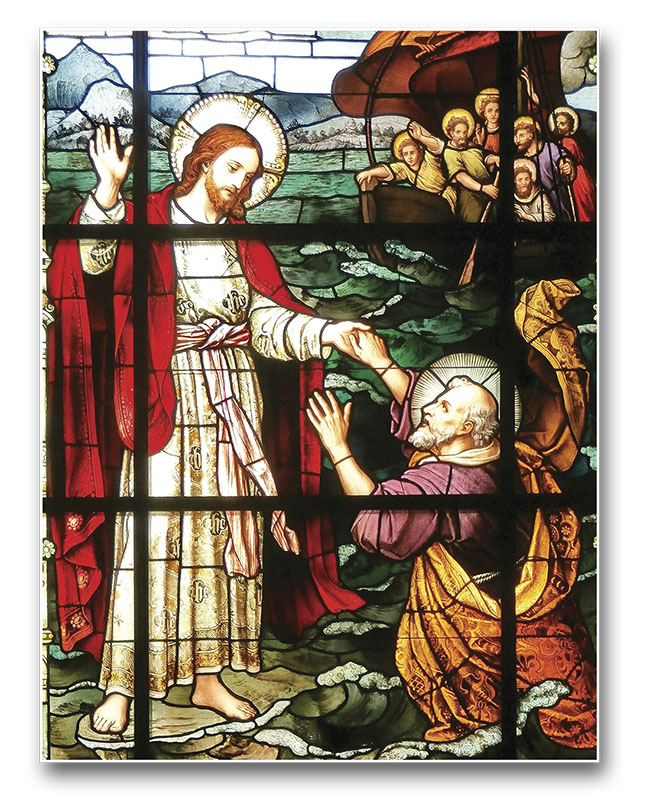
And Peter began to sink…
St. Peter, always impetuous, asked permission to go out to meet the Lord. He consented and the Prince of the Apostles began to walk fearlessly over the turbulent waves. He firmly believed in the Master’s power. But at a given moment he looked at himself and then the sea… Natural fear overcame his confidence in the supernatural. Peter began to sink.
Then he loudly cried out asking Jesus to save him. Perhaps one of the Psalms came to his mind which the Jews of the time learned as children: “Save me, O God! For the waters have come up to my neck” (Ps 69:1). The Creator of the sea came and extended His saving hand, uttering a divine admonishment: “O man of little faith, why did you doubt?” (Mt 14:31).
When both climbed into the boat, the raging wind ceased and the sea was calm. Everything returned to perfect order. Those few witnesses of this spectacular scene and Our Lord’s absolute power over the forces of nature worshipped Jesus and proclaimed His divine filiation: “Truly You are the Son of God” (Mt 14:33).
This is also our story
What happened to the Prince of the Apostles repeats itself in some way in our lives. We know, like Peter, that Jesus Christ is God, we await His intervention in history, and we pray, requesting His help. But, just like Peter, we often doubt… We lack the virtue of confidence.
Through this virtue, man acquires the certainty that God and His Most Holy Mother will help him overcome all the problems along his way. Led by the light of reason and the light of faith, inspired to hope against all appearances and in face of the most seemingly invincible obstacles, he neither panics nor doubts. Rather, “in the most terrible situations he remains calm and collected, for he knows that Our Lady will come to his aid.” 1
Therefore, when navigating the stormy waters of this valley of tears we enter into a whirlwind of trials, let us not be swept away by the winds of uncertainty. Let us confidently fix our eyes on the Saviour and Mary Most Holy. They will calm the storm and our ship will safely reach the port.
Fear upon perceiving our own insufficiency
However, it may happen that without doubting in the power of the Most High and His desire to help us, we dread to approach Him and to completely surrender ourselves into His hands. The infinite disproportion between the divine perfection and our great miseries seems to irremediably separate us from Him.
Nothing could be further from the truth. To demonstrate this, let us consider another episode in Peter’s life.
On one occasion, while the Divine Teacher was on the shore of Lake Gennesaret, He climbed into Peter’s boat and had him put out a little from the shore, and from there He preached to the crowds. Despite Peter’s fatigue, for he had fished all night without catching anything, the disciple paid close attention to the divine discourse.
To his surprise, when He had finished preaching, the Master ordered him to go further out into the sea and to cast his nets once again. During the entire night the sea had not yielded anything to those fishermen. Nevertheless, the order of a Man as extraordinary as He could not be disregarded. St. Peter did not know that from that day on he would cast apostolic nets to win souls.
Having obeyed the Master’s will, the Apostle could not believe his eyes, nor could he haul in the nets bursting with fish, which he had just cast out with misgivings. It was necessary to ask help from another boat, and both almost sank due to the quantity of fish.
When Simon Peter realized what had happened, he fell on his knees at Jesus’ feet and made an entreaty so frequently repeated down through the centuries by those who feel the burden of their own insufficiency: “Depart from me, for I am a sinful man, O Lord” (Lk 5:8). This time, Jesus did not heed his request. Instead, He reassured him and made a promise: “Do not be afraid; henceforth you will be catching men” (Lk 5:10).
The Master did not abandon the new Apostle. He drew him to Himself and showed him how much He wanted him to arise and follow Him. God makes the same invitation to us at every moment: “Above all, Our Lord is concerned that you might fear Him. Your imperfections, your weaknesses, your most serious faults, your repeated relapses will not drive Him away, provided that you sincerely wish to repent. The more miserable you are, the more He has pity on your misery, and the more He desires to fulfil His mission of Saviour in your regard.” 2
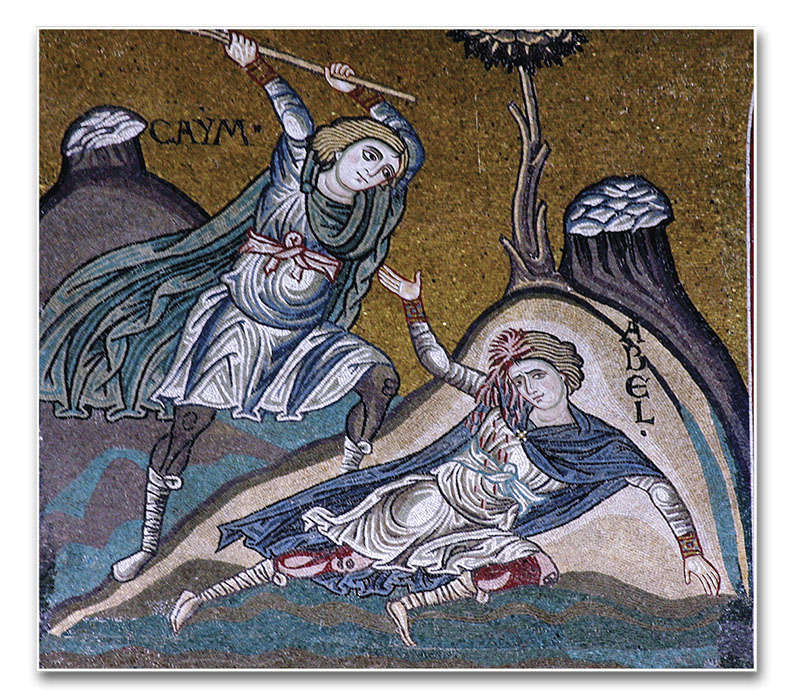
Let us work with our minds turned heavenward
St. Peter did nothing wrong by fishing all night. Work is necessary and just. God does not expect total passivity from those who confide in Him; nevertheless, even material cares should be placed entirely in His hands.
It is necessary to work steadfastly for the glory of the Creator of the universe, knowing, at the same time, that without Him we can do nothing. This principle is well expressed in a Psalm sung by the Jews while on pilgrimage to Jerusalem: “It is in vain that you rise up early and go late to rest, eating the bread of anxious toil; for He gives to His beloved sleep” (Ps 127:2).
Simon Peter had let down his nets according to the rules of his profession, but he had obtained nothing. To teach him trust in the supernatural, Our Lord worked the miraculous catch.
Following the example of the Prince of the Apostles, we should cast out the nets of our efforts into the sea of this world, always bearing in mind the golden rule given by St. Ignatius of Loyola: “In all that you have to do, here is the rule of rules to follow: trust in God, whilst acting as if success in everything depended wholly on yourself, and at the same time, whilst you leave nothing undone to ensure success, do not rely on your efforts, knowing that God alone can do everything and you nothing.” 3
Now, if this can be said of “the bread of anxious toil,” how much more evident is this truth in connection with God’s grace. Nothing, absolutely nothing can be attained in the supernatural order by our efforts, not even a pious sign of the Cross can be made. “Let us work, then, as well as we are able, but always with our mind and heart fixed on God.” 4
We cannot flee from God
Those who believe their actions are not seen by God or think they can deceive Him are completely deluded, failing to recognize that He sees the most hidden intentions of the human heart. Equally futile is the effort of those who seek to hide themselves from the divine gaze, living as if He did not exist.
This state of spirit is not much different from the appalling attitude of Cain, millennia before our birth. When his younger brother Abel offered the first fruits of his flock as a sacrifice, God was pleased with him. However, his were rejected, for the Creator could not be gratified to receive the mediocre fruits that he offered.
Seeing himself rejected by God, Cain became extremely resentful, and the Lord said to him: “Why are you angry, and why has your countenance fallen? If you do well, will you not be accepted? And if you do not do well, sin is couching at the door; its desire is for you, but you must master it” (Gn 4:6-7).
Cain did not heed the divine admonition. Thinking it possible to escape the omniscient gaze of the Most High, he brought Abel out into the field and there he committed the first murder in history. The innocent blood cried out to God for vengeance, and He did not delay in punishing the culprit.
Those who, like Cain, resist when they hear the voice of Christ calling them to conversion, tend to fall into despair: “Therefore, O guilty souls! Do not be afraid of your Divine Saviour; it is for you, especially, that He has come on earth. Do not repeat the cry of the guilty Cain: ‘My iniquity is greater than that I may deserve pardon’ (Gn 4:13). How this would amount to being ignorant of the Sacred Heart of Jesus!” 5
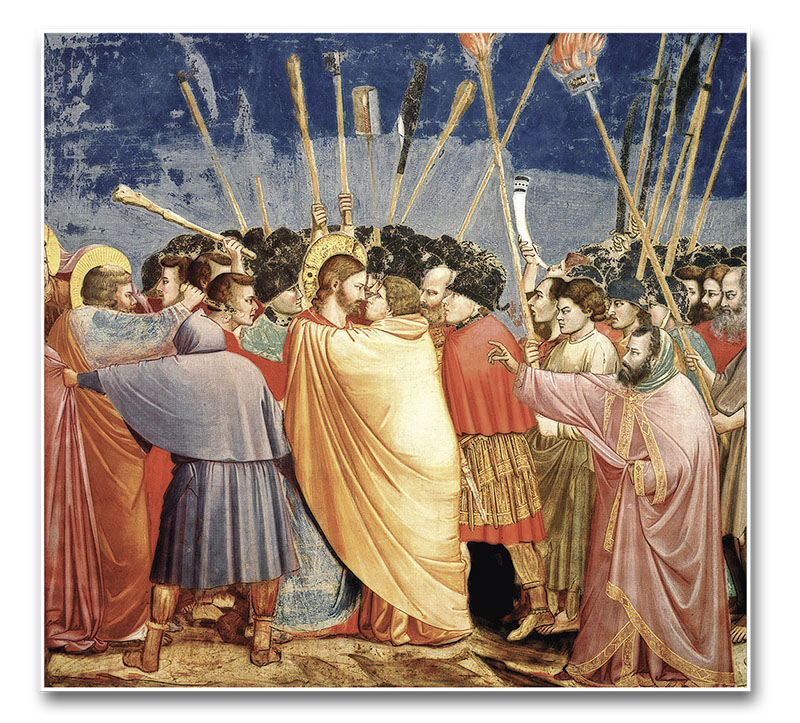
At times it seems God has abandoned us
There are some people who strive hard to attain virtue. They pray much, confess frequently and make good resolutions, but they relapse into the same faults and tend to lose heart.
Indeed, the evidence of our weakness should help us to practise the virtue of humility; but to allow this to lead us to discouragement would be the worst of evils. “Had not Mary Magdalene led a sinful life? And yet grace in an instant transformed her. Without any transition the sinful woman became a great Saint. Now, then, the arm of God is not shortened. What He has done for others, He can do for us. Do not doubt this: confident, persevering prayer will obtain the complete cure of our souls.” 6
At times, God leaves us with the impression that He no longer wants to speak with us. The voice of Christ can no longer be heard in our interior and, worse still, He seemingly no longer wants to hear us. We feel abandoned.
This terrible trial demands one of the most extraordinary acts of confidence possible. Both the righteous and the sinner are subject to it. In both cases, it is necessary to persevere: “Let nothing, then, ever weaken your confidence! Even though you be in the depths of the abyss, call out unceasingly to Heaven. God will, at last, respond to your appeal and will accomplish His work in you.” 7
To know God’s hour is beyond human capacity. Nevertheless, of one thing we can be sure: at some point in our life, we will hear the “voice of Christ, mysterious voice of grace” resounding in the silence of our souls, whispering “in the depths of our hearts words of sweetness and of peace.” 8
The Saints are those who confided and looked heavenward
The trial of abandonment suffered by Saints is especially extreme. Precisely because they are just, they recognize their indebtedness to Providence; and when some trial befalls them they attribute this abandonment to their own shortcomings. And they respond by giving themselves over, with an unconditional love, to Him who wounds them, without expecting retribution.
“St. Francis de Sales, in his youth, suffered a trial of this kind. He trembled at the thought of not being predestined to Heaven and he spent a number of months in this interior martyrdom. His suffering was so great that it injured his health. At last a heroic prayer delivered him from it. Prostrate before Our Lady’s altar, the Saint beseeched Mary Immaculate to obtain for him that he might love her Divine Son on earth with a love as ardent as the fear he had of not being able to love Him in eternity.” 9
All the Saints confronted difficulties which required of them struggle and confidence, confidence and struggle. But, in the most tragic moments of life, they looked heavenward, awaiting the moment of Our Lord’s intervention, and thus they vanquished the storms and arrived at the port of salvation. Their heart was inundated with the certainty that God and Our Lady would never abandon them.
Supreme proof of power and love
Sinners or Saints, all ought to confide in the assistance of the Divine Redeemer. Whether in moments of apparent abandonment or in those of interior joy, Jesus always intends our good. “He will leave nothing undone to help us in this affair, so supremely important, of our salvation. Behold the great truth which Jesus Christ has written with His precious Blood and which we are now going to reread together in the history of His Passion.” 10
Arrested and humiliated, Christ gave us the supreme proof of His love and His power. In walking upon the water and raising the dead to life He showed His dominion over nature and life. His adversaries had tried to kill Him by throwing Him over a precipice in His own city, Nazareth, but their plot failed. Jesus escaped death when He wished, and at the time set for the Passion He voluntarily delivered Himself up.
The henchmen who went to arrest Him in the Garden of Olives also heard His voice. Not, however, the calming voice heard by the disciples on the stormy sea. This time, when He said to the guards sent to apprehend Him: “I am He,” “they drew back and fell to the ground” (Jn 18:6). Who could withstand the voice of the Omnipotent One? Only a Judas, the culmination of treason and disgrace.
Just previously, Judas had heard the Master’s final invitation to conversion; but, as a spiritual descendent of Cain, he closed himself to the voice of grace and the merciful gaze of the Master. “Judas betrayed Him with a hypocritical kiss. Jesus speaks to him with touching gentleness. He calls him His ‘friend’. He tries by tender affection to touch that heart, hardened by avarice. He says to him: ‘Friend, whereto art thou come?’ (Mt 26:50). ‘Judas, dost thou betray the Son of Man with a kiss?’ (Lk 22:48). This is the last grace of the Master to the ungrateful one. It was a grace of such force that we shall never understand its intensity. Judas, however, rejects it; he is damned, because he so willed.” 11
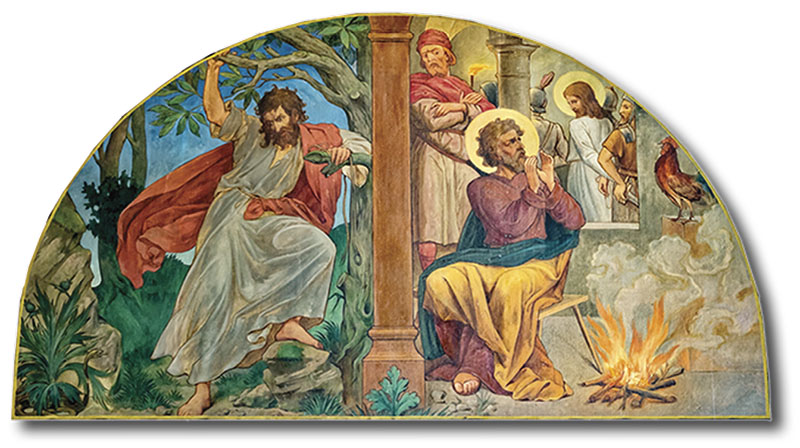
Peter accepted the invitation to repentance
Peter also sinned gravely: he abandoned the Lord in the Garden of Olives and, shortly afterwards denied Him three times in the courtyard of the high priest’s palace. Believing himself to be strong, and determined to follow the Master wherever He went, the Apostle confided in his own strength and… he failed. The cock’s crowing, however, reminded him of Jesus’ prophecy: “this very night, before the cock crows, you will deny Me three times” (Mt 26:34). And the voice of grace invited him to repentance.
In contrast with the infamous Judas, Peter accepted this invitation in the depth of his soul. Jesus did not have to say a single word, for at moments like these a look is worth more than a thousand words: “Their gazes meet. It is a grace, a fulminating grace, that is carried to Peter by that gaze. The Apostle does not reject it; he goes out and weeps bitterly over his faults.” 12
Grace also makes an invitation to us: to have absolute confidence in Our Lord and His Most Holy Mother. They will never abandon us, however grave and numerous our sins may be.
God gives us these two examples in the Gospel. Let us choose the way of confidence, of St. Peter; let us flee from the path of despair, of Judas. “As in the case of Judas and Peter, Jesus always offers us graces of repentance and conversion. We are free! It is for us to choose between good and evil, between Heaven and hell. Our salvation is in our own hands.” 13 ◊



